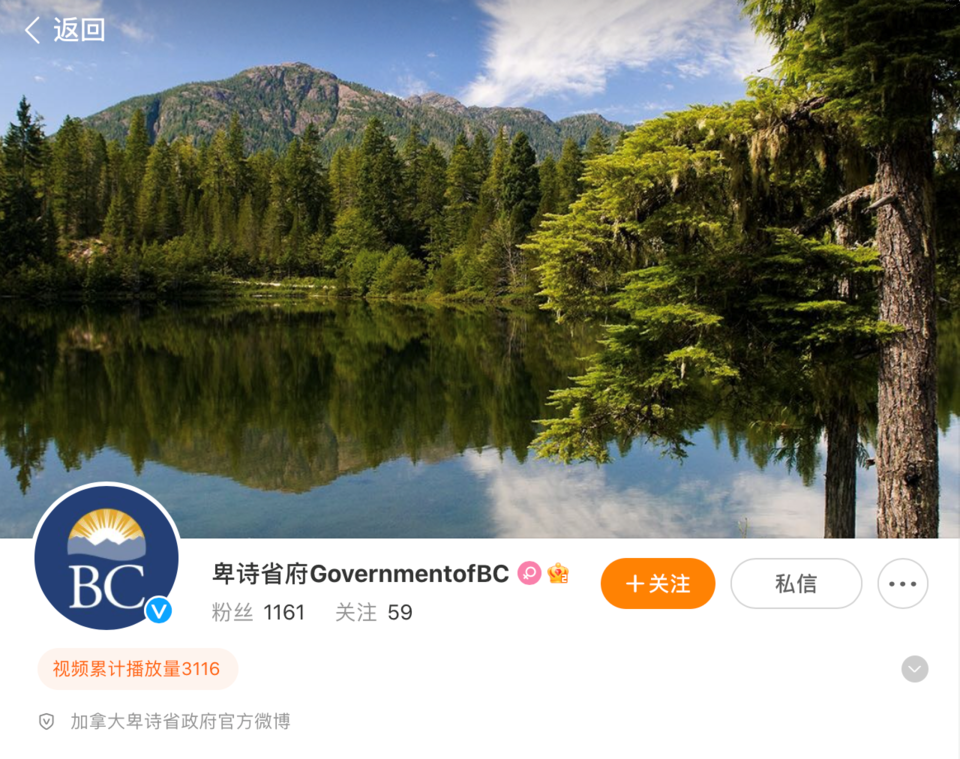Anne Kang, the NDP minister in charge of sa���ʴ�ý’s economic immigration program, announced Aug. 16 that the government had opened an account on Weibo, a Chinese-language social media service sometimes compared to Twitter (or X).
But Charles Burton, a former diplomat at sa���ʴ�ý’s embassy in Beijing, called it “irresponsible to the extreme.”
“Serving Canadians in their native languages should be through Canadian social media with the data derived stored securely on servers in sa���ʴ�ý,” said Burton, a China analyst with the Macdonald-Laurier Institute think tank, pointing to privacy and national security concerns.
By the time it had announced the verified account, the sa���ʴ�ý government had 1,100 followers and 47 posts about public safety, emergency preparedness, cost of living, housing, education, health care and justice services. The move comes almost six months after sa���ʴ�ý followed Ottawa’s lead and banned the TikTok video app from government devices for security reasons.
“Weibo is not being downloaded to or used from any government assets such as computers or cell phones,” said a statement from Kang’s Ministry of Municipal Affairs. “A third-party contractor is responsible for day-to-day account administration – at arm’s length from government.” Vancouver marketing agency Catalyst Agents, a Weibo, WeChat and TikTok specialist, is the contractor, but the Ministry refused to disclose the maximum value of the contract.
The Ministry of Municipal Affairs estimates that 11 per cent of sa���ʴ�ý’s population counts Chinese as their first written language and Weibo has an estimated 800,000 users in sa���ʴ�ý, out of 600 million worldwide every month.
An account is not needed to view the content, but the government recommended account-holders review and understand Weibo’s privacy conditions.
"But we know thousands of people in sa���ʴ�ý do use Weibo to stay up to date on current events and news, and it’s critical that we reach people with information that’s accessible to them in their preferred language – for example about things like health care or wildfires,” the ministry said.
A leader of the Vancouver Society in Support of Democratic Movement, which advocates for democracy and human rights in China, called it disturbing.
“In the name of ‘providing service’, this would be another opportunity for agents of the [Chinese Communist Party] to infiltrate Canadian society, and to try to influence the views of overseas British Columbian-Chinese,” said Mabel Tung.
It is not the NDP government’s first foray into Chinese social media. During former premier John Horgan’s 2018 China trade mission, he visited with executives from Tencent, owner of WeChat, to sign a tourism promotion agreement for the Destination BC Crown corporation.
“It will give sa���ʴ�ý a preferred marketing platform on the messaging social media app, which attracts over 900 million daily active users – making it one of the largest in the world,” the government boasted in 2018.
A professor at McGill University’s School of Information Studies said it is understandable why the sa���ʴ�ý government is on Weibo and WeChat, but there are potential negative consequences.
Benjamin Fung, sa���ʴ�ý research chair in datamining for cybersecurity, said the Chinese government can use algorithms to restrict the reach of sa���ʴ�ý government posts.
“Instead of recommending a post to 10,000 people, they can just show it to 100 people. If they do not want you to see something, it will not appear on your list while you are browsing,” Fung said.
Weibo is also useful in tailoring a foreign interference strategy, he said. "The participation of the sa���ʴ�ý government on these platforms provides a wrong signal to the general public that these platforms are safe to use.”
More than two years before China’s foreign interference in Canadian elections and intimidation of politicians became one of the biggest national news stories, the Liberal Public Safety minister at the time told a House of Commons committee that Canadians should be wary of using China-based social media apps.
“I would say yes, there is a legitimate concern that sometimes the information that's publicly available on those platforms can be used by the hostile activities of state actors, and some caution should be exercised,” Bill Blair testified at the Special Committee on sa���ʴ�ý-China Relations in February 2021.
In the June 2021 Buying Silence: The Price of Internet Censorship in China report, the Washington, D.C.-based Jamestown Foundation estimated China budgeted US$6.6 billion in 2020 to govern online public opinion and dispose what it deemed “harmful” online opinion through its Cyberspace Affairs Commissions (CACs).
“To do so, they monitor posts on platforms such as WeChat and Weibo, as well as foreign social media, including Facebook and Twitter. CACs also employ teams of network commentators—internet trolls collectively referred to as the ‘50 Cent Party,’ to ‘guide the trend of public opinion’ inside and outside the country,” the report said.
In 2012, then-Vancouver mayor Gregor Robertson became one of the first western politicians with an account on Weibo, which became a key strategy in marketing Vancouver as a destination for tourists and real estate investors.
Robertson’s office hired a consultant from a Beijing company called Flow Creative to prepare content and identify and contract key influencers to promote the mayor’s account.
Kang, who was first elected in 2017 to represent Burnaby-Deer Lake, is originally from Taiwan. She raised eyebrows in January as the senior sa���ʴ�ý government official at the pro-Beijing Canadian Community Service Association Lunar New Year banquet in Richmond’s River Rock Show Theatre.
Kang and fellow NDP MLAs George Chow and Henry Yao were seated at the head table with local Chinese diplomats, across from Rongxiang “Tiger” Yuan, the president of the sa���ʴ�ý-China Friendship Promotion Association who had a career in China’s People’s Liberation Army.

